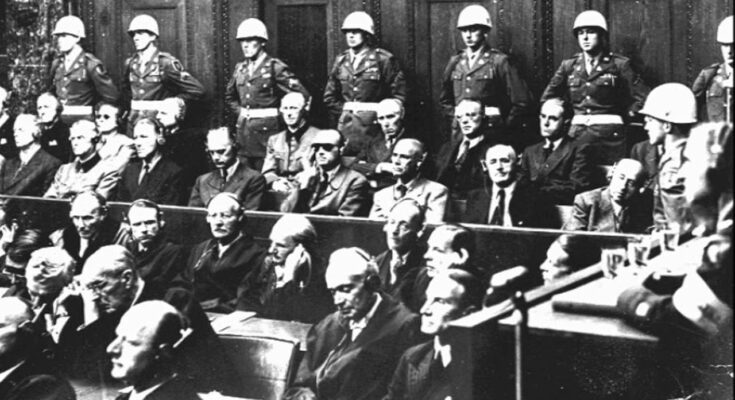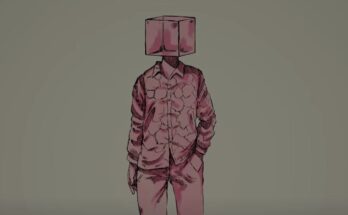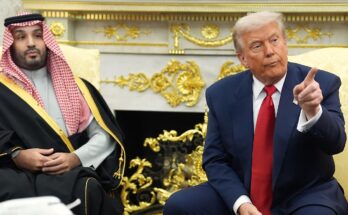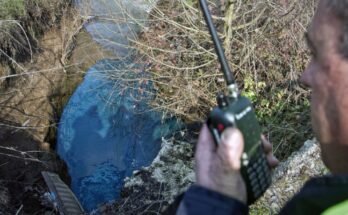On September 30 and October 1, 1946, the verdicts against the defendants at the Nuremberg war crimes trials were announced. (archive image)
Source: AP
“Come closer. I’m just the son of a mass murderer, not the man himself,” said Niklas Frank with a smile. Almost in awe, the 13th graders at Paul-Pfinzing-Gymnasium formed a semicircle around the 86-year-old. Niklas Frank, white beard, dark jacket, hand gripping the handle of his cane, stands next to an old American ammunition box.
This is an exhibit in the “Memorium Nuremberg Trials”, a museum dedicated to a short but special chapter in German history. In such an ammunition box, explains Andrea Betz, curator of remembrance culture, the Americans have collected legally relevant documents – decrees, orders, everything that could help in court.
“The Nazis produced a lot of documents,” he explains, “and they also bragged about their murders.” “Not Nazis, but us Germans,” Frank corrected. A sentence that reflects his entire attitude towards life.
What made the Nazis tick? US psychologist Gustave M. Gilbert investigated this question during the Nuremberg Trials. In intensive conversations he studied the soul of the main actor.
September 13, 2021 | 43:54 min
Life against silence
Niklas Frank was a writer, enlightener and son of Hans Frank, known as the “Butcher of Poland”. He was born in 1939 and grew up in Krakow at Wawel Castle, the former seat of the Polish king. His father was governor general of Polish territories occupied by the Wehrmacht but not annexed, a man who stood out for his cruelty among the many German war criminals.
“My father was responsible for all the crimes that we Germans committed in Poland,” said Niklas Frank. Likewise with the mass murder at Auschwitz. After the war ended, Hans Frank was found guilty of war crimes and crimes against humanity. He was hanged in October 1946 – Niklas Frank was seven years old at the time.
His father was convicted at the Nuremberg Trials for heinous crimes during World War II. Niklas Frank explains this today and urges people to keep it in mind.
Today he stands, surrounded by students, in Hall 600 – the wood-paneled room in the Nuremberg Palace of Justice where the trials began 80 years ago.
Remembering can’t stop
A student wants to know how he feels when he talks about his father. “Still angry,” Niklas Frank said, frowning. “Why are we doing all this?” These are the questions that accompany and shape him throughout his life. Niklas Frank combed through archives, read his father’s meticulous service diary, and spoke with relatives and contemporary witnesses. In order to be able to process family history, he wrote the book, “The Father – A Reckoning”.
A book “against the silence in this country,” Frank said today. For him, raising awareness about National Socialism is a never-ending mission. He campaigned tirelessly against populism and right-wing extremism throughout his life. He still speaks to students today, patiently listening to their questions, telling stories and reprimanding them.
In November 1945, the “Nuremberg Trials” to try Nazi war crimes began by trying 24 major war criminals.
November 20, 2020 | 2:13 min
The Nuremberg trials still have an impact today
80 years ago, when the trials began, questions arose about how to punish the perpetrators responsible for the world wars and the Holocaust as well as the perpetrators of industrial murder. The Nuremberg Trials were a new jurisdiction at that time.
250 journalists reported the start of the trial on November 20, 1945. The world wanted to be there when the Nazi leaders were tried. There is no international criminal court, and there is no clear definition of what constitutes genocide.
Of the 24 defendants, twelve were sentenced to death and seven to prison. Three defendants were acquitted and two cases were closed without conviction. It was an attempt to find words for the incomprehensible. It wasn’t just people like Hans Frank in the dock, it was a system. The Nuremberg Trials were the final chapter in the collapse of German civilization and at the same time the birth of modern international law.
Christoph Söller is an editor at ZDF state studio Bavaria.
The Dachau concentration camp was liberated 80 years ago. Apart from the survivors, the liberators also took part in the memorial service – and appealed to never forget what happened.
May 4, 2025 | 2:52 min



